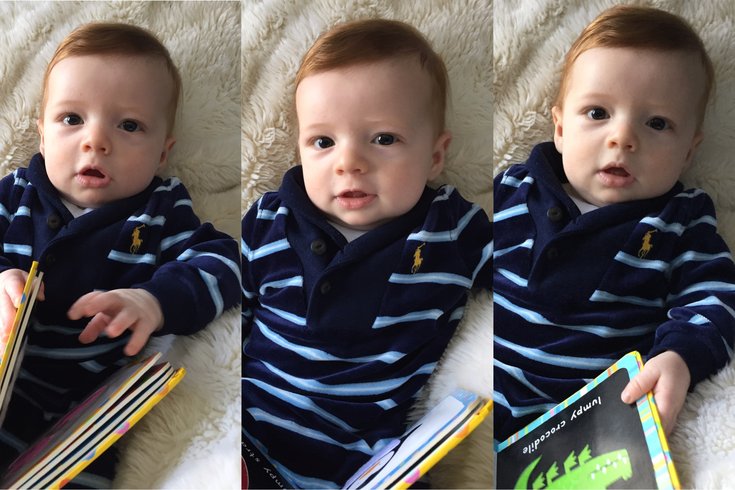
March 07, 2017
 Katie Gagnon /for PhillyVoice
Katie Gagnon /for PhillyVoice
Katie and her baby love storytime. One of Killian's favorite baby books is 'Baby's Very First Touchy-Feely Book.'
To say that I love to read is an understatement. Books have always been an important part of my life. Even though my time as a mama is limited, I prioritize reading. I pick up a book when I’m nursing my baby and spend 20 minutes each night reading The New Yorker before bed. My parents are avid readers and they instilled in me a love of books. As a young child, going to the library was as good as going to the candy store. I read "The Great Escape" in second grade. I loved Battle of the Books in middle school. I fell in love with Shakespeare in high school. I minored in English in college. My Mom and Dad read to me every day when I was young. It is a practice I have now started with my son.
More than continuing a family tradition and imparting my love of literature, introducing books to Killian is important to his development. The American Academy of Pediatrics (AAP) says reading to your child and talking about pictures in books can strengthen language skills, literacy development and also benefit your parent/child relationship. When babies are read to during infancy and preschool, they have better language abilities when they start kindergarten and are more interested in reading. Parents who read to their children develop more nurturing relationships, which is paramount to a child’s cognitive and social-emotional development. According to Reach Out and Read, reading aloud to babies and children builds motivation, curiosity and memory and also helps kids cope with anxiety and stress.
There is a room in my home that we call the library. It holds hundreds of books, including dozens of children’s books. Every morning after playtime, Killian and I go into the library for his mid-morning feeding and I read from a children’s chapter book. I spend this time exposing Killian to longer stories and a broader vocabulary. So far, we have finished " Charlotte’s Web," "The Complete Tales of Winnie-The-Pooh" and "Alice’s Adventures in Wonderland and Through the Looking-Glass." We are currently reading "Robinson Crusoe" from a set of classic children’s books from my youth. My pediatrician said that reading aloud is good for my baby boy, no matter the subject. I could read him the biography of Theodore Roosevelt that I just started or the novel I just finished. Any kind of early exposure to language has an incredible impact on children’s lifelong learning. But I have really enjoyed revisiting these stories from my childhood.
The AAP says it is important for infants and toddlers to also be exposed to age-appropriate baby books with rhymes and pictures, so we read a couple of these each day, during which I point to and name the illustrations. One of Killian’s favorites is "Baby’s Very First Touchy-Feely Book," which encourages him to feel different textures, like a bumpy red strawberry. We also really love "The Real Mother Goose" and all the Dr. Seuss books. I like reading Killian’s last baby book of the day after his bath and before bedtime. The "Good Night" books and "Goodnight Moon" are our favorites for storytime before sleep.
One of the gifts I plan to give my son when he is older is a complete set of The Hardy Boys first-edition books. I search them out in book and antique stores and so far have three in his collection. I loved Nancy Drew books as a young girl, and I hope that one day he enjoys these detective novels as much as I did the sister stories. Giving him classic, paperbound books is not only my way of gifting him with literature but also encouraging the simple pleasure of sitting quietly with a good book – an activity that may seem antiquated in my son’s childhood of omnipresent technology.
Making time for reading is not just beneficial to your children but will also enhance your adult life. There are a number of scientific reasons that we should all pick up a book. Sometimes it may seem impossible as parents to find the time to read. If you make it an activity you share together as a family, you will successfully incorporate reading into your life. Read a short story together before bedtime. Visit your library for children’s storytime and reading activities. Give books as presents. I encourage you to support your child’s development by carving out as much time as you can for reading books for your mutual benefit.
In the words of the beloved Dr. Seuss (whose 113th birthday would have been last week), “The more that you read, the more things you will know. The more that you learn, the more places you'll go.”
Do you read to your child every day? What is your favorite children’s book? Share with me in the comments section below or tweet me @ThePhillyVoice and @KathleenEGagnon.